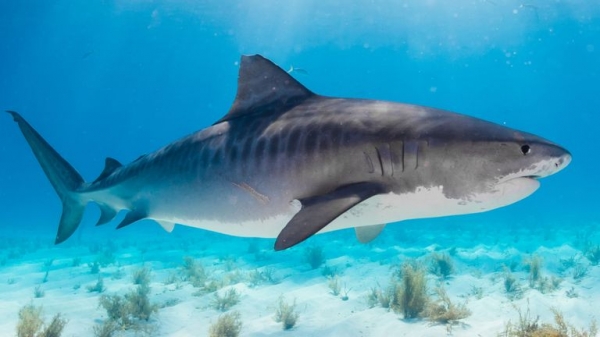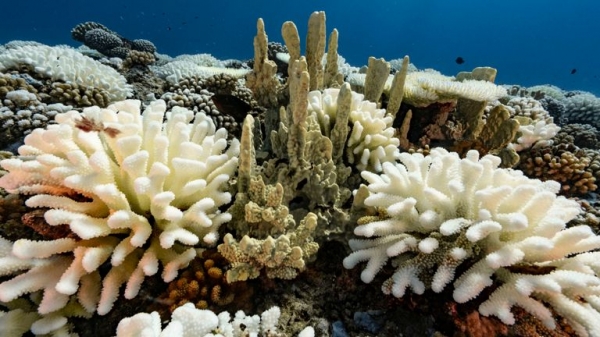A study says there are 700 ocean dead zones – where there is not enough oxygen to support marine life – up from 45 prior to 1960.

The next 10 years are crucial to combat declining ocean oxygen levels which are threatening sealife and could “jeopardise humankind”, experts have warned.
The International Union for the Conservation of Nature’s (IUCN) report, the biggest study of its kind, says oxygen loss can mainly be blamed on pollution and climate change.
Some of the study’s findings include:
- The world’s oceans are expected to lose 3-4% of their oxygen by 2100There are now around 700 confirmed ocean dead zones, up from 45 before 1960The major causes of ocean oxygen loss are climate change and nutrient pollutionOxygen depletion is already affecting fish such as tuna, marlin and sharks
In the study, Peter Thomson, the UN’s special envoy for oceans, said: “I believe the report demonstrates that the next 10 years will be more important for humanity than the last hundred, indeed thousands of years have been for our survival.”

The report has been presented at the global UN Climate Change conference in Madrid.
Dr Grethel Aguilar, IUCN acting director general, said: “With this report, the scale of damage climate change is wreaking upon the ocean comes into stark focus.
“As the warming ocean loses oxygen, the delicate balance of marine life is thrown into disarray.
“The potentially dire effects on fisheries and vulnerable coastal communities mean that the decisions made at the ongoing UN Climate Change Conference are even more crucial.”
Some 67 experts from 17 countries were involved in the study.
It says there are now about 700 confirmed ocean dead zones – where there is effectively no oxygen – but that with many yet to be identified the number could actually be more than 1,000. This is up from just 45 prior to 1960.
Deoxygenation, which refers to the loss of oxygen from the oceans due to climate change, is starting to alter the balance of marine life, favouring species which do not need as much oxygen, such as microbes, jellyfish and some squid, the report says.
Tuna, marlin and sharks are particularly at risk because their size means they have higher energy demands.
These bigger fish are starting to move to shallower areas, the authors say – which makes them much more vulnerable to over-fishing.
Oceans are expected to lose up to 4% of their oxygen by the end of the century “under a business-as-usual scenario”, but the impact will be bigger in the levels closest to the surface, where many species are concentrated.
The impacts of deoxygenisation “will ultimately ripple out and affect hundreds of millions of people”, the study says.
“We are now seeing increasingly low levels of dissolved oxygen across large areas of the open ocean,” said Dan Laffoley, a co-editor of the report.
“This is perhaps the ultimate wake-up call from the uncontrolled experiment humanity is unleashing on the world’s ocean as carbon emissions continue to increase.

The issues behind the climate crisis
“Ocean oxygen depletion is menacing marine ecosystems already under stress from ocean warming and acidification.
“To stop the worrying expansion of oxygen-poor areas, we need to decisively curb greenhouse gas emissions as well as nutrient pollution from agriculture and other sources.”
Isabella Lovin, Sweden’s minister for environment and climate, wrote in the report: “Whilst we have known about dead zones in the ocean for many decades, ocean warming is now expected to further amplify deoxygenation across great swathes of the ocean.
“Ocean deoxygenation is putting life at risk. Failing to protect our ocean will jeopardize humankind, as our security, economy and our very own survival depends on it.”
Listen to “A New Climate” on Spreaker.
:: A New Climate is a series of special podcasts from the Sky News Daily. Listen on Apple Podcasts, Google Podcasts, Spotify, Spreaker
Teenage activist Greta Thunberg, who arrived at the Madrid conference on Friday, said: “The climate crisis is still being ignored by those in power.”
It comes as three of this year’s Nobel Prize laureates spoke out about addressing climate change at a news conference in Sweden on Saturday.
Esther Duflo, one of the economics winners, warned that dealing with climate change “will require a change in behaviour, particularly in the rich countries” that are heavy consumers of goods and energy.
